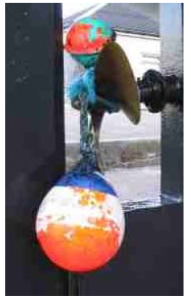The Charity
Aviation
Maritime
Encounters with Fishing Gear 1

Initial Report
It can happen to Fishermen too!
Report Text:
I am an experienced fisherman, but a floating pot line damaged the transducer bracket on my boat, luckily at slack low water. Tide started to make dangerous ground to the east, but the boat was freed in time. The pot line was not weighted, but did at least have a Dan buoy. The damage cost £300 to repair.
Encounters With Fishing Gear 2 – When it Goes Wrong
Report Text:
My wife and I were in our sailing boat departing the harbour which has a tricky entrance with cross-tides and lengthy transits through rock strewn areas marked by infrequent channel marker posts. Approaching the final stages of the pilotage under engine, we noted a collection of pot marker buoys scattered in the entrance. Having made a course correction to avoid the pot markers, we concentrated again on navigation. A short while later, there was a bang and the boat started to slow down although the engine kept running. It was apparent that we had lost drive and we were being swept towards rocks. We completed a rapid sail hoist and just managed to achieve control and sail clear of the entrance. Subsequently, we completed an overnight sail back to a marina for repairs.

The damage was a sheared flexible drive coupling, a bent propeller shaft and a wrecked shaft seal requiring a 10 day haul-out and repairs totalling £2000. This marker buoy turned out to be a style we had not encountered before with a large buoy at the top of the riser and a small pick-up buoy at the end of a long length of floating line. I believe that we had steered between the main buoy and the pick-up buoy. This incident happened in benign conditions and we managed to look after ourselves. In less clement weather or darker conditions, the incident could easily have an unpleasant outcome. I appreciate that we are “pleasure boat” sailors and fishermen have to make a living, but it cannot be safe to lay such obstructions in the constricted confines of harbour entrances. If the professionals cannot apply common sense to their activities, legislation must be required.
Encounters With Fishing Gear 3 – It’s Not All Bad News
Report Text:
I am still concerned about the amount of unmarked pot buoys along the south coast, especially in the Weymouth area. Recently there were five within the direct approach to Weymouth harbour, all unmarked. Some while ago I picked up one which was being pulled down by a tidal flow and was being blown onto leeward rocks, saved in the nick of time by a local dive boat. The line contained what looked like stainless steel wire.
Again recently, in choppy sea I had one foul my stern gear which has resulted in having to buy new props and craning out, which is an expensive operation. In passing I would like to offer my thanks to the fisherman who puts really good Dan flags on his pot buoys which are along the Lulworth Banks.
CHIRP Comment:
Regular readers will know CHIRP has been assisting in the capture of data on encounters with unmarked fishing gear. The above reports are examples of the type of incidents reported and illustrate different perspectives.
CHIRP has received 17 reports of encounters with fishing gear and other flotsam and jetsam in 2005 and 36 reports since the beginning of our co-operation with the RYA’s data collection initiative in 2003.
According to the Maritime and Coastguard Agency’s Advice to Fishermen and Yachtsmen on the Marking of Fishing Gear (www.mcga.gov.uk/c4mca/ fishgear.pdf); some 25% of fishing gear incidents reported to the Coastguard involve fishermen themselves. At best, expensive gear may be lost and at worst, lives may be put at risk.
There is plenty of evidence showing many people fish responsibly, however there is also no shortage of evidence demonstrating that some do not. Some Harbour Authorities are beginning to take steps, in co-operation with stakeholders, to manage the navigation safety issues resulting from fishing activities within their areas by agreeing gear marking, designating areas and periods for fishing, etc. These co-operative agreements are likely to prove more successful than regulation and the Maritime Advisory Board hopes that many more Harbour Authorities will choose to embark on similar initiatives, encouraging compliance with published best practice and using enforcement powers where appropriate.
CHIRP believes that the information submitted to the MCA, MAIB, NFFO and RYA should assist them in developing an accurate assessment of the risks to life associated with these encounters and in identifying appropriate solutions, where required.
The nature of the incident data made available by CHIRP does however impose some limitations on the range of responses that may be made and reporters should consider whether reports to local Harbour Authorities, Coastguard, MAIB, RYA would be more appropriate.
CHIRP will continue to offer a reporting facility in circumstances where:
- You are concerned to protect your identity (please note that anonymous reports are not accepted).
- You wish others to benefit from an important “Lesson Learned”.
- Other reporting procedures are not appropriate or are not available.
- When you have tried other reporting procedures without the issue having been adequately addressed.
The MCA’s 24hr Info No. is 0870 6006505.
(Hazardous incidents may be reported to your local Coastguard Station.)







